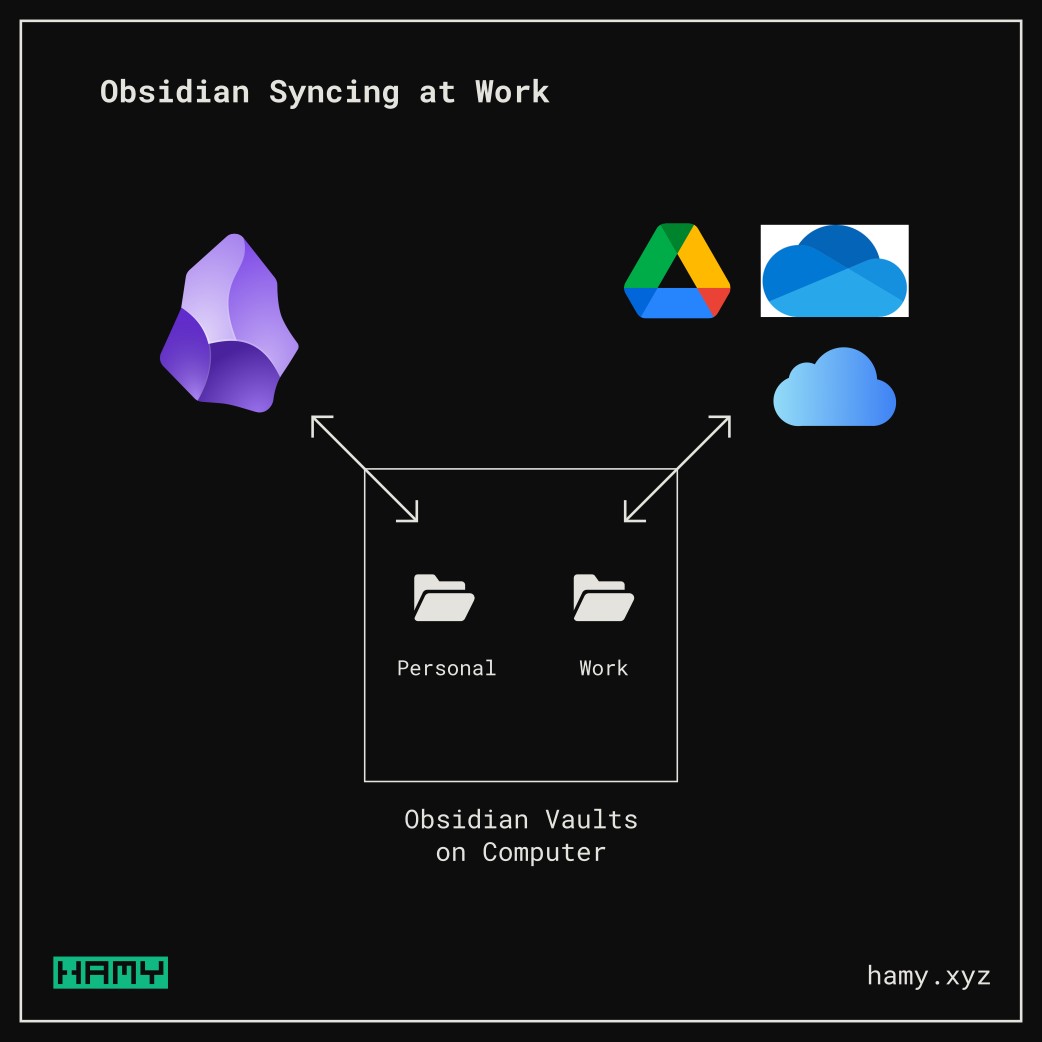How to use Obsidian Sync at Work (without breaking the rules)
Essay - Published: 2025.10.01 | 2 min read (725 words)
career | create | gadgets | notes | obsidian | productivity | software-engineer | system
DISCLOSURE: If you buy through affiliate links, I may earn a small commission. (disclosures)
I've recently been exploring Obsidian as an alternative to Notion for my notes. One of the big reasons was that it would allow me to use it for both personal and work notes, something I couldn't do with Notion unless my workplace had an explicit license / approval (none did).
Here I want to share my setup for using Obsidian with syncing that aligns with most work rules.
Work Rules
Let's first look at common rules for software at workplaces and how Obsidian stacks up against them.
- Don't use software you don't have a license to. Obsidian is 100% free for personal and commercial use so no license needed.
- Don't use software that doesn't have approval. Obsidian may not be on your company's pre-approved software list but it's basically just a glorified text editor like VSCode so will typically get approval if you're careful about the syncing options, which we'll talk about in a sec. There's also the issue of plugins adding arbitrary behavior on the device with similar issues as VS Code plugins but approvals will follow a similar flow.
- Don't sync data outside of work-approved systems. This is the big one as any notes you take may incidentally contain trade secrets. If your work doesn't have an Obsidian license or has not approved its sync engine then you can't use the built-in sync.
Caveat that every company has its own rules around software and data storage / transfer so you should read those to make sure it applies to your situation.
Obsidian Sync
Obsidian has a built-in sync option if you pay for a subscription. This works well and is a great way to get notes synced across different computers / mobile devices.
I personally use this for my personal notes and it works great. Not the fastest sync in the world but only takes a couple seconds so rarely gets in my way and requires zero configuration.
As we discussed, this option is not allowed at workplaces that have not approved Obsidian's note syncing. Moreover you need a subscription so it won't be paid for without a commercial license. In my experience very few companies have explicitly approved Obsidian's syncing and have a commercial license for it so it's basically banned by default.
But remember, Obsidian is basically just a text editor on Markdown files for better or worse. So we can implement syncing on our files without breaking any of our IT rules.
Work-compliant syncing
In most cases, local files on your work-approved device is okay. It's a bit muddier if there's a Bring Your Own Device (BYOD) policy as they typically require all work data to stay inside of work tools or only be accessed via a VM or something so be sure to read the policies.
If local is okay, then you can backup your folders using whatever file storage system your work licenses. Most of the big players have an ability to backup local files / folders to the cloud, effectively building your own file sync engine.
Common examples include: Google Drive, Microsoft OneDrive, Apple iCloud, Box, and DropBox.
My Obsidian setup at work

- Personal Notes - Vault synced in via my Obsidian Sync. Most companies allow some level of reasonable personal info / usage on your machine so long as the work / personal stuff is well separated. I sync mine in because it contains my daily todos and Creation Cycle systems and templates which I can copy over when I need them.
- Work Notes - Vault located in my Google Drive folder using the Google Drive app on my computer. It syncs in regularly and is even indexed in Google Drive search if I'm looking for something.
Next
I've found Obsidian's simplicity (it's all just Markdown) refreshing. It's fast, simple, and allows me to take notes with the same tool in my personal life and at work.
If you liked this post you might also like:
Want more like this?
The best way to support my work is to like / comment / share this post on your favorite socials.
